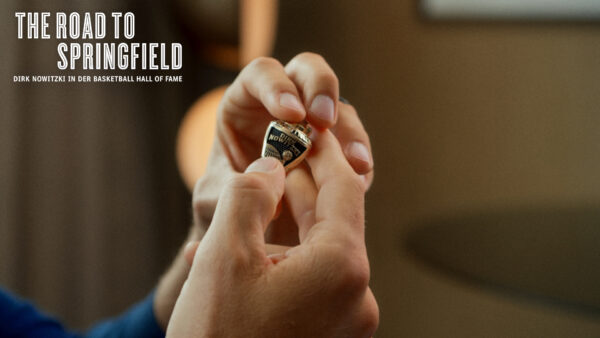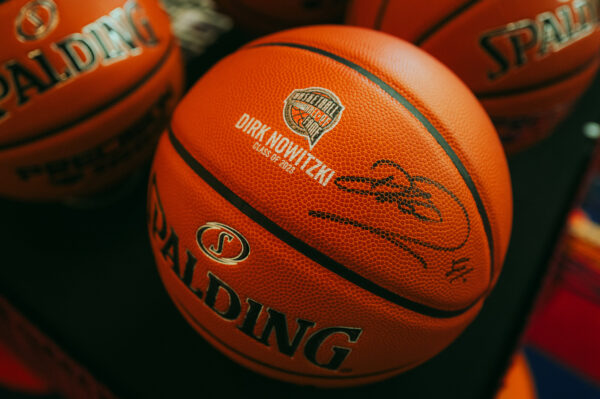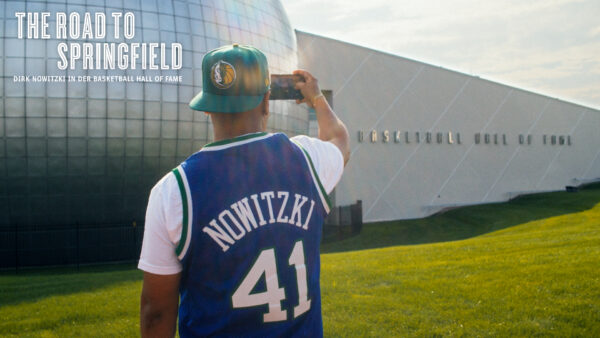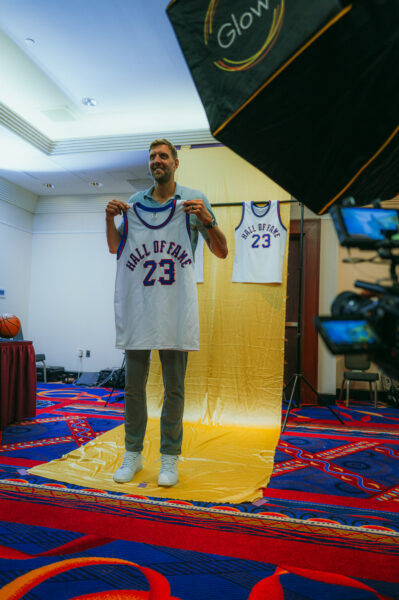Dirk Nowitzki’s story is an improbable one: a slender, self-conscious boy from Würzburg, the German provinces, who blossoms into a superstar in Dallas, Texas. A 14-time All Star, MVP, and Finals MVP. 1667 games played, #6 on the all-time scoring list. World Champion in 2011. Most valuable player at World and European Championships. Twyman-Stokes Teammate of the Year. Olympic flag-bearer. It’s a glitch, some trick of providence that a skinny kid from a soccer-mad country like Germany became a legend of an all-American sport. A boy who dared, who ventured out into the world, became arguably the best European to ever play the game. A role model, a mentor for an entire generation of European NBA players, MVPs and MVPs-to-be, for the Jokićs, Antetokounmpos, and Dončićs. For all of us. And that’s what’s truly special about Dirk Nowitzki: He would never mention any of this himself. Self-regard was never his thing.

The Ring © FORTYONE, ZDF
In Dallas, his second home, everyone has a touching or glowing or funny story to tell about Dirk. He played for only one team, his team, for 21 years, an arguably unsurpassable mark. In Dallas, basketball is Dirk Nowitzki. He holds the golden key to the town hall, he’s the city’s unelected mayor-for-life. When you drive through downtown Dallas to see the Mavericks play at the American Airlines Center, you first turn onto Nowitzki Way, the street named after him, and then past a larger-than-life Dirk in white bronze, frozen mid-flamingo fadeaway. Dallas has long been more than just a home-away-from-Wuerzburg for him, the city embraced him and claimed him as their own. Loyalty Never Fades Away is inscribed on the statue’s pedestal.
Dirk Nowitzki’s game stands out in America’s vast sports history—statistically, historically, and culturally. He stretched the floor like no other big man before him. He shaped and changed the sport he has loved since he was a kid. Basketball after Dirk is different from basketball before him: he made it more agile, more variable, less predictable, more refined, more sophisticated. International, worldly. He changed its philosophy: how to play basketball, how to think basketball. He put his stamp on all of us, on our sport. And now he’s a Hall of Famer. Again: Dirk would never say it like that, but maybe he does sometimes think of those all-important letters after his name: Dirk Nowitzki, HoF. Good for him. He earned this moment.
Before Dirk Nowitzki became one of the best basketball players of all time, an international sporting legend even, he’s just a normal kid in Wuerzburg-Heidingsfeld. His parents, Joerg and Helga, own a painting business—Joerg talks to the customers, Helga runs things in the background. His father has a sense of humor, his mother keeps an eye on everything. The Nowitzkis like sports: Dirk’s father plays handball, his mother and sister play basketball, they all spend the weekends at the local tennis club. Dirk plays everything, but nothing seriously. Despite his size he can move, but he doesn’t know where to go. In his room are posters of Charles Barkley and Scottie Pippen, the Bulls are his team. He watches Toni Kukoć play. Detlef Schrempf. Arvydas Sabonis. Dražen Petrović. The great Europeans before him. Dirk has dreams, but they feel like dreams.
On a Sunday afternoon in April 1993 everything changes. In a high school gymnasium, he runs into the cranky Renaissance man Holger Geschwindner—an encounter that turns the world upside down, for both of them. Once the best, and most unconventional, German basketball player—of the same generation as Bill Bradley—he now works as an engineer, physicist, philosopher, and educator. He’s seen almost everything, but he’s never seen anyone play like Dirk Nowitzki. The kid has all the tools. The range. Holger immediately senses that this kid wants to push himself. To push against the boundaries of the game.
»What’s your name, kid?« he says.
»Dirk,« says Dirk. »Dirk Nowitzki.«
»You already know some things that can’t be taught,« Geschwindner says. »Who’s teaching you the tools of the trade?«
At least that’s how they remember the beginning. After the first training sessions with Geschwindner, it becomes clear to Dirk what he wants: To shoot. Run. Pass. Shoot again. That feeling when the ball glides through the net, swish, at the ideal angle, again and again. The perfect shot. He loves the serenity, the freedom he feels on the court. Being in complete control of his tools.

Ball of Fame © Philipp Reinhard
Both know that they have a chance to do something special. They have the confidence to do it. They rethink everything: Dirk walks around the gym on his hands but skips the weights. They don’t count their shots in packs of ten, they break away from decimal thinking, from percentages of good and bad. They train to jazz, focus on the beat, on improvisation. Tak tadam. They assemble a group of players to complement and challenge Dirk’s game, local guys: Demond Greene, Robert Garrett, Marvin Willoughby. In the summer they row across Lake Starnberg, in the winter they win games. To help him to think bigger, Holger gives Dirk books: Jamila by Chinghiz Aitmatov. Typhoon by Joseph Conrad, and Heart of Darkness. Dirk needs to be prepared for everything imaginable.
They rebuild Dirk’s shooting mechanics from scratch. Holger takes Dirk’s measurements: arm length, shoe size, vertical leap. He calculates release points and trajectories. They paint the ideal shooting arc on the gym’s wall. Holger uses a giant broom to force Dirk to shoot higher, so that the angle of incidence is exactly 47 degrees. So even the not-quite-perfect shots are more likely to fall. The basket as big as a lake.
The kids are successful, they change German basketball from the ground up: Offensive firepower, intuition, and improvisation trump traditional 1990s European basketball: defensive, systematic, rational. They are still young and make mistakes, but everyone can see their potential. But just when the team is about to be promoted to the first German division, Dirk has to make the most important decision of his young life.
George Raveling, the great Hall of Famer, then Director for International Basketball at Nike, had secretly convinced Geschwindner to send Dirk over to San Antonio for the 1997 Nike Hoop Summit. Dirk has to decide: Will he stay in Germany? Or does he want more? He jumps on a plane and for the first time sets foot in the city that will become his home: Dallas, Texas. When the international squad holds their practices in The Baylor Tom Landry Center, nobody knows how good this lanky kid from Germany really is. How good he can be.

The Hall of Fame in Springfield, Massachussetts © FORTYONE, ZDF
Nobody but Donnie Nelson—who knows international basketball well and is the assistant coach for the »Rest of the World« team—and his father Don, who just became the Mavericks’ head coach. The Nelsons already know that they want Dirk, even before he steps on the court of the Freeman Coliseum in San Antonio on March 29, 1998, and scores 33 points, grabs 14 rebounds, and wins the Summit for Team World. They know they caught a glimpse of the future of the game.
Dirk is the future, but his first season in the NBA is not easy: the lockout, the incautious predictions of the Nelsons (»He’ll be Rookie of the Year«), the lack of immediate success, the fans heckling, a hard landing in the best league in the world.
In the second year, however, the mood changes. Mark Cuban takes over the team and changes the whole culture. Michael Finley, Dirk Nowitzki, and Steve Nash become Filthy, Dirty & Nasty, the Dallas Big Three, three gym rats and best friends. Dirk doubles his scoring and rebounding. The boos turn to cheers. And then to euphoria.
The Mavs are winning. They become a playoff team and then contenders. By his third season, Dirk is the team’s leading scorer. When Nash and Finley leave Dallas in 2004 and 2005 respectively, the team suddenly belongs to Dirk. Breaking up Filthy, Dirty & Nasty is a business decision. Dirk learns to take nothing for granted. He keeps working, adapts, and in 2006 takes his team to the Finals against the Miami Heat, against Dwyane Wade and Shaquille O’Neal. They are up 2-0, and in the 4th quarter of game 3 they lead by 13. Dirk’s dream is close. It’s right there. But they lose the game—and then they lose the next three in a row. Dirk is crushed.

Hall of Famer © Philipp Reinhard
The following season, the Mavericks win 67 games. Dirk does it all, again: He scores, rebounds, passes. He’s incredibly efficient. Most of all, he has fun again. But when the Mavericks play the eighth-seeded Golden State Warriors in the first round, they become only the third top seed to lose in the first round. Don Nelson is the Warriors’ head coach, and he knows Dirk too well. After the final horn sounds, Dirk heaves a trash can against the wall, out of sheer disappointment. It leaves the famous »Oakland Hole« in the wall, 10 feet high—a testament to how much he cares. (He later autographed it, and when the Warriors left Oracle Arena for good, they took this historic piece of plaster with them.)
What follows feels worse than the first-round exit: Dirk is named MVP. In what is objectively one of his greatest individual moments, he grieves. »I was so embarrassed,« he will later say, and it speaks volumes that, to this day, he considers receiving this award—the highest individual accolade in the league—the most difficult day of his career. For Dirk, the only true success is team success.
But Dirk Nowitzki wouldn’t be Dirk if he didn’t find a way out of this hole: He takes a six-week trip through the Australian outback with Holger to get his mind off of things. He changes his diet, works with greater meticulousness, clearer focus. The defeats make him become special, physically, tactically, and above all mentally. An all-time great. »Failure doesn’t exist,« the great Kobe Bryant will later say; »There is no failure in sports,« says Giannis Antetokounmpo; »Try again. Fail again. Fail better,« says Samuel Beckett.
Dirk and his Mavs try again, but in 2011, they are a different team. Dirk is five years older, five years smarter and more experienced. He’s better. At his side: Jason Terry, Jason Kidd, Tyson Chandler. Shawn Marion. J. J. Barea, Brian Cardinal, Peja Stojaković. Coach Rick Carlisle. A good team, yes, but no one would put their money on this version of the Mavs. »Too old,« they say, for the long, draining playoffs, »past their prime.«
And then Dirk happens. His Mavericks beat Portland in the first round, sweep Kobe’s Lakers in the second, and wear out the young Oklahoma City Thunder—Durant, Harden, Westbrook—in the Western Conference Finals. Dirk plays the best postseason of his life. Nothing can rattle him: no defender, no score, no injury, no illness. He sees the game more clearly than anyone else. He doesn’t celebrate when they make the Finals, and when he watches the Heat win the East a few days later, he simply switches off the TV. »Miami,« he says. »Let’s go.« He’s not vengeful. Not angry. Not afraid of history repeating itself. He’s Dirk.
Five years after his first shot at the championship, Dirk is back where he was before: in the Finals against the Miami Heat, now with LeBron James and Chris Bosh. And still with Dwyane Wade. Dirk can win it all. It’s Dirk’s team, but most of all: it’s a team.
Perhaps the most impressive Dirk moment in his career comes in the second game of the series: Miami leads 1-0, and in Game 2 they are up 88-73 with 7:14 to go. But Dirk refuses to lose again. He scores or assists on every play that follows. A few minutes later, he ties the game at 90 apiece. Time out.
If you look in Dirk’s eyes at this moment, you get the impression that he simply knows what’s going to happen. »The past of the future,« Geschwindner calls this experience, when time is no longer chronological, when it simply is. They have worked on this thought. It’s as if Dirk doesn’t have an inkling of doubt, not even a glimmer of skepticism. At this moment, Dirk perceives nothing that can get in his way.
The crowd, all in white, is screaming when the teams come out of the time-out, but these screams are of no concern to Dirk Nowitzki. The Heat draw up a play, but they miss a three; Dirk gets the rebound; Kidd pushes the ball up the court, passes to Terry on the left. Terry moves into the middle while Tyson Chandler sets a hard screen on Dirk’s defender, Chris Bosh. Chandler knows what he’s doing; no ref is going to call a foul if he sets a clean pick. Bosh can’t get through. Dirk has an open look from three.
This shot may be the most important one in his career.
He makes it: 93–90. »This is beautiful basketball,« Jeff van Gundy exhales on TV. The game ends 95-93. The Mavericks go on to win the series and the championship. Dirk has done it. He has won it.
After 2011, the Mavs return to the playoffs a few times, but they do not return to the finals. It’s Dirk’s loyalty that people talk about. The money he gives up so the Mavs can put together a decent team. His milestones, the 30,000th point. His farewell tour—a tour that was never officially announced but developed organically nevertheless. His last home game, when Larry Bird and Charles Barkley and Scottie Pippen and Detlef Schrempf show up. Out of love and respect for a player who loves the game of basketball as they do. A player who changed and shaped the game and its culture. A player who admires his predecessors and the successors who will follow in his footsteps. A humble, relatable human being. »Dirk Nowitzki is like us,« I wrote at the time. »Only much much better.«
And now he’s a Hall of Famer.